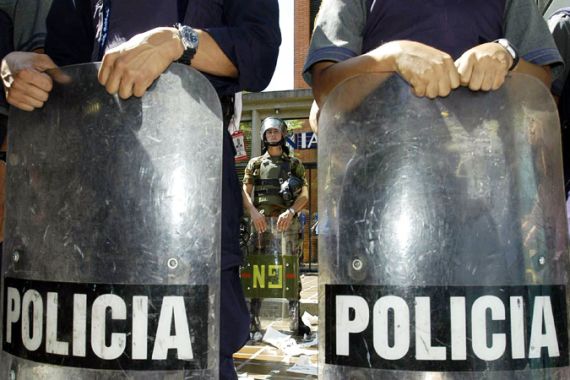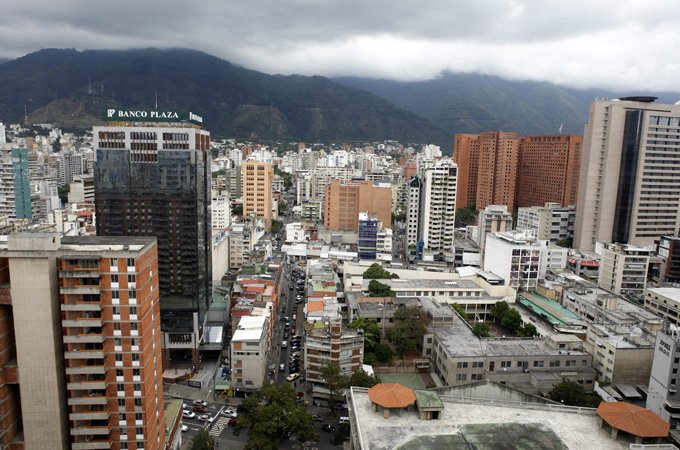What’s behind Venezuela’s violent crime problem?
Caracas, the capital, has one of the highest murder rates in the world.

 |
| Some believe that President Hugo Chavez’s militant rhetoric exacerbates the violent crime problem in Venezuela [EPA] |
Before joining the Los Angeles Philharmonic, the conductor Gustavo Dudamel often led Venezuela’s celebrated youth symphony in performances at the Central University of Venezuela. The university’s concert hall is a rare enclave of architectural loveliness in Caracas: Alexander Calder designed a tremendous sculpture for its ceiling, and murals decorate the surrounding plaza. That prized plaza was damaged last Friday, when armed assailants attacked the university in an outburst of the peculiar violence that has come to define the Venezuelan capital.
The gunmen lit fires just outside the concert hall, attempted to force open its doors and cloaked the entryway in tear gas. Their intent, it appears, was to interrupt the tallying of votes from that day’s student-body government elections; the group destroyed machines used for counting and prevented students from delivering ballot boxes to the election committee. The academic departments in which votes were lost scheduled new elections for Wednesday, only to be stopped again with a second volley of tear gas.
This week’s offensive at the Central University says a lot about the nature of Venezuela’s violent crime problem, which most residents cite as the country’s most pressing. The homicide rate in Caracas rivals that of Ciudad Juarez, and Venezuela’s rate – more than 60 per 100,000 people – is three times Mexico’s.
But unlike Mexico, where the military is battling well-armed and well-organised drug trafficking organisations (which also fight amongst themselves), Venezuela is not in the midst of a drug war. Nor is Venezuela contesting an insurgency or fighting a foreign power or otherwise engaged in combat.
Rather, the killing in Caracas is decentralised and diffuse. Thousands die in small-scale gang disputes. Petty theft often ends in murder. Deaths in street crime are so common that one of Venezuela’s principal NGOs, the Venezuelan Violence Observatory, is launching an advertising campaign featuring the message, “Value Life”. Mariana Caprile, the woman behind the initiative, told me that she hopes to encourage young men “not to kill for no reason. If you’re going to rob a bus,” she says, “there’s just no reason to shoot the driver.”
How has Venezuela become so dangerous? As a recent report from the International Crisis Group summarised, Venezuela’s surging cocaine trafficking creates conflict, and the rapid accumulation of small arms in the hands of civilians makes conflict more deadly.
Declining law enforcement – what Venezuelans have come to refer to incessantly as la impunidad, or “the impunity” – facilitates infractions. The vast majority of crimes, including homicides, go unsolved; Venezuela’s investigative police, the CICPC, arrived at the Central University only Monday to examine the site of Friday’s attack. By that time, university officials and students had already cleared away some of the debris.
Chavez’s influence?
The administration of Hugo Chavez, who assumed the presidency in 1999, has presided over these developments. Reports from the Drug Enforcement Administration allege that top officials in Chavez’s government are connected to major cocaine traffickers. The president has increased the number of guns in circulation by creating civilian militia units and providing many recruits with weapons and training.
And Roberto Briceno-Leon, the director of the Venezuelan Violence Observatory and a sociologist trained at the Central University, believes that Chavez’s militant rhetoric exacerbates the problem. Among similarly bellicose comments, Chavez has told his massive television audience: “You must be ready to take up your arms at any time and give your life if necessary for the Bolivarian revolution.”
Strangely enough, there is little evidence that Chavez’s popularity has suffered as a result of the extraordinary crime wave. Venezuela holds regular elections, and neither Chavez nor incumbent state governors appear to have lost votes in the parts of the country where violence has increased most dramatically.
“People don’t seem to blame the government for the security problem,” Gerardo Gonzalez, an analyst with one of Venezuela’s top polling firms and a Central University of Venezuela graduate, told me in an interview. “In fact, it seems to us that violence might even help Chavez: the more people talk about violence, which they don’t attribute to him, the less they’re talking about unemployment, which they do attribute to him.”
University administrators and outside observers immediately reproached pro-Chavez groups for this week’s violence on campus, noting that the pro-Chavez candidate in the elections, Kevin Avila, had obtained few votes in the initial tally. They also observed that the police normally maintain a monopoly on the tear gas used in the attacks, wondering aloud where the assailants might have obtained it.
Press articles recalled a string of similar incidents of aggression against anti-Chavez students over the past five years. Some accounts even claimed that the antagonists chanted, “We are Chavista Castro-Communist hordes” as they moved through the campus, a prospect that the pro-government press flagged as implausible. Kevin Avila, for his part, attributed the attack to right-wing factions.
Whether or not pro-Chavez groups were responsible for the attack, the incident illustrates the way in which the government enables violence without directly committing it. Were the government systematically subjugating all independent political organizations, assaulting the university elections might be seen as an unsurprising attempt to control a powerful student body, part and parcel of an overarching strategy.
In Venezuela, though, opposition parties still operate national organizations and, moreover, the anti-Chavez students who won the university election are still set to take control of the student council. In Venezuela, in short, the government did not itself attack the Central University – rather, by minimising enforcement, it makes such attacks more likely.
The same can be said of the 60 homicides that occurred in Caracas last weekend, an average toll for this city of four million, and of the dozens more that will take place tomorrow and Sunday. Chavez, remarkably, has created an environment in which such incidents are usual, a society that no longer expects public order, a capital with wartime levels of violence but no war. In the end, that may make it all the more difficult to broker peace.
Dorothy Kronick is a graduate student at Stanford University. Previously, she lived in Venezuela as a Fulbright scholar.
The views expressed in this article are the author’s own and do not necessarily reflect Al Jazeera’s editorial policy.
